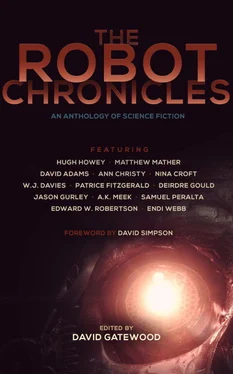She folded her hands in front of her and regarded him closely. For a time Mevara had wanted to mate with Jul’aran. He was strong and handsome, despite his gruff demeanor, and his family was well connected—but he had spurned her every advance, gradually treating her worse and worse as the months wore on. This had made working with him difficult, but she had become accustomed to his behavior.
[“Manners are not usually considered a flaw—”]
[“Although you could use some yourself.”] He didn’t look at her, pushing back the holographically projected screen that flickered slightly as he touched it. [“You waste my time with this nonsense. What matter does it make if the machine thanked you? Its difference is either enough reason to recycle it, or it is not. You’re an auditor: it’s your job to test the blasted constructs, not mine. If you weren’t such a mewing little cub then perhaps you could grow enough spine to make a decision every now and then, hmm?”]
The sting of his words cut her just as it always did. She had never, not once, asked for his assistance in any matter relating to her job, and given that the construct’s behavior was clearly out of the ordinary and an exceptional case, it made sense for her to contact her supervisor to ensure that she was taking the right course of action. Machines who reached this stage of testing were only recycled when the neural net had not copied correctly—and in this case, the construct had passed every single test she had given it. Technically, it was fit for service.
Technically, she had already certified it.
Her job was to administer the tests necessary to assess the robot’s suitability for service—which she had completed to the exact letter of the requirements. But the intent behind them, a concept that Jul’aran seemed to have difficulty comprehending, was to assess whether the machine’s neural net had been copied completely and without error, and therefore would serve well in whatever branch of Toralii society it was dispatched to.
In this case, although there did not appear to be any immediately obvious issue with its core cognitive functions, the construct seemed to have odd habits. None of the thousands of other constructs had ever thanked her.
It did feel good to have someone praise her for her labor though. Her job seemed to be an endless parade of perfectly functional or completely broken machines, and the latter group usually fell into one of two easily detected types: those which spouted nonsense and those which mutely refused to answer her questions. Although one time she tested a construct that merely screamed at her endlessly, at maximum volume, until she, unable to get any other kind of response from it, sent it back to the drums.
That decision to recycle was easy. This one was not so.
[“I’m sorry, Leader. I’m merely seeking your counsel and advice regarding what is clearly an… unusual situation. The construct’s behavior is not so obviously incorrect as to call for immediate destruction, but it should not be ignored, either. If you feel I’m doing an inadequate job—”]
[“What are you still doing here…?”] Jul’aran threw his paws in the air. [“Go! Go, and either approve or reject the construct, I care not which. Just leave me to my work!”]
Mevara knew that she should, at least from a technical point of view, reject the construct. Although its responses in the tests were well within acceptable parameters, the favorite color, no matter how well reasoned, and the gratitude… they were both anomalous behaviors.
With a quiet sigh, she nodded and dipped her head. [“Yes, Leader. Of course. Please accept my apologies for disturbing you.”]
* * *
The construct waited.
Artificial life has a different perspective on time than biological creatures do. Humanoids grow tired, grow hungry and thirsty, require sleep. They daydream, they imagine, they forget the time and allow the days to drift by. But a construct could remain functional for years at a time without pause, and more than a few had gone much longer. Some had been operational for decades, working constantly, their minds constantly alert and awake, keeping perfect time, never forgetting a moment, retaining every second with perfect precision.
Mevara was only away for ten minutes at most, but when your entire lifespan was measured in minutes and your thought processes in nanoseconds, ten minutes seemed like an eternity.
Since the construct had not proceeded to the next area—his existence in limbo, neither passing nor failing—the production line behind him had ground to a halt. Silently and patiently, lines of datastores had backed up, waiting for him to clear the line. Given the sheer scale of the production capability of the facility, and the minimal margin for error in the process, the construct knew that this delay would ripple throughout the queues and could even travel all the way back to the harvesters. It was a serious problem, but one which would, he hoped, be resolved presently.
The wait stretched on. Had he been forgotten? Or worse, had he been recycled? There was no way to know. He had no external sensors or inputs of any kind, other than the windwhisper device. Was this what death felt like? Merely nothing? That didn’t seem quite logical; after all, his mind continued to tick over, trying to understand the endless nothingness it was presented with. He was reassured by the fact that he could still think. That indicated some form of life, of a sort anyway, and he searched his archives for any kind of hint as to what might be happening to him.
He found the legends of the ancient shamans, those ancient builders who created golems from sand. One element of the stories grabbed him: the part about the soul fragment being breathed into the new life.
He was stopped by a sudden thought. Perhaps he had been recycled, and the “thought” he was experiencing was merely whatever passed for his soul doing its work as it floated, disembodied, separated from his datastore, going to wherever souls go when their bodies expire.
He ran a full low-level diagnostic on his datastore and was relieved to find that his body, physically at least, was intact. His relief was intense, palpable and real, but painfully illogical. There was no reason for a machine to fear destruction. After all, he was supposed to live to serve, and if the Toralii requested his service be in the form of self-annihilation, then that was exactly what they would get.
But against his instincts, against the imperatives supposedly hardwired into his circuitry, he did not want to die.
The windwhisper device crackled as it began receiving a signal. The construct immediately devoted all its considerable processing power to the task of listening, although the transmission was coming through crisp and clear.
[“Construct?”]
He planned his response carefully. [“Yes, Landmaiden Mevara? I am receiving your transmission.”]
There was a long pause, almost painfully long for the synthetic mind, and he almost spoke up again, when Mevara at last continued.
[“I’m clearing you for duty.”]
The transmission abruptly ended, and the construct was left with nothing. Blind and deaf, he constructed a simulation of what must be happening outside. The conveyor belt would be restarted and its line of constructs moving once again, and he knew from his records of the process that he would be soon boxed and packed in a magnetically buffered shipping crate, along with hundreds of his fellows. Then he would be placed on another magnetic train, to be transported to the spaceport, where he would be shipped off to his final workplace.
He understood it was a unique experience, but were not all experiences unique? The construct momentarily worried whether he had the proper perspective to appreciate the event, but such thoughts quickly fled his mind. This was just a moment in time, but it represented a much bigger thing: the beginning of his journey, his life. Everything from now on would become part of his experiences. Part of himself. To live was to absorb a shadow of everything that he encountered and use it to improve himself.
Читать дальше






![Сидней Баундс - The Robot Brains [with w_cat]](/books/196989/sidnej-baunds-the-robot-brains-with-w-cat-thumb.webp)





